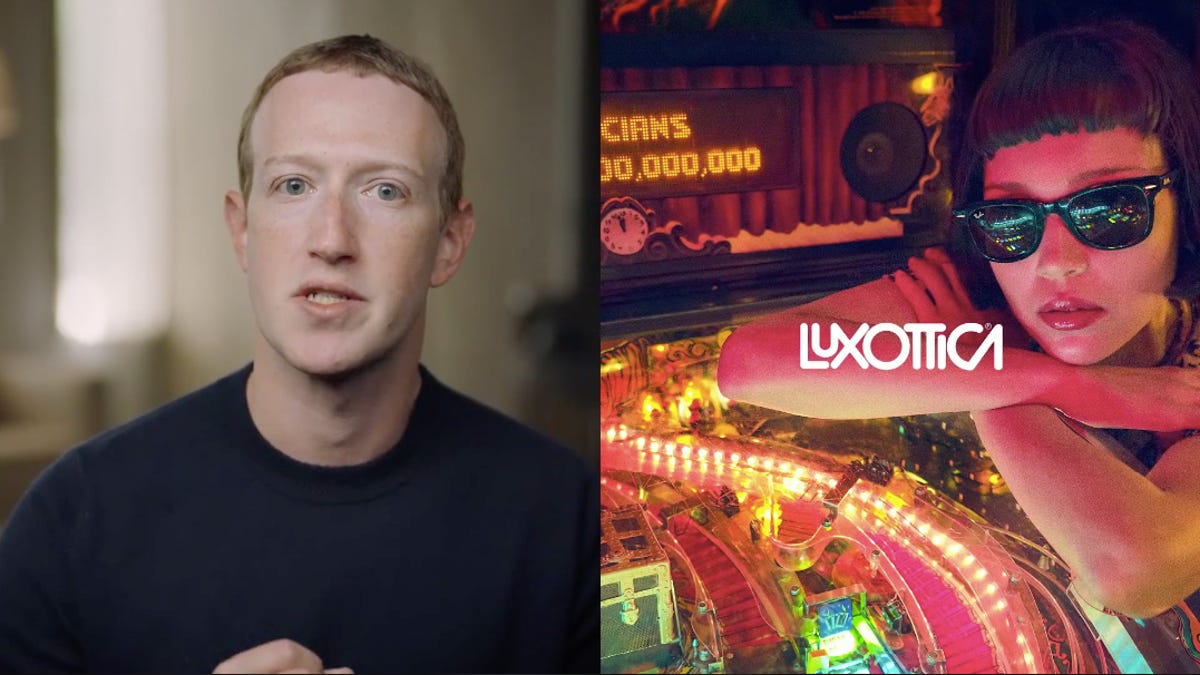Facebook wants to put smart glasses on your face next year
"They're gonna be the next step on the road to augmented reality glasses," Mark Zuckerberg says. "And they look pretty good too."

Facebook CEO Mark Zuckerberg says the social network is working on smart glasses.
Facebook CEO Mark Zuckerberg said Wednesday the social network plans to release its first pair of smart glasses next year.
The company has partnered with EssilorLuxottica, which owns eyewear brands including Ray-Ban, to support different designs and styles for the upcoming glasses. The glasses will bear the Ray-Ban brand.
"I can't go into full product details yet, but they're gonna be the next step on the road to augmented reality glasses, and they look pretty good too," Zuckerberg said at Facebook Connect, the company's virtual reality and augmented reality conference. The event used to be known as Oculus Connect.
Facebook also unveiled a new version of its Oculus Quest VR headset with an upgraded processor and higher-resolution display. The new headset, called the Oculus Quest 2, has a price tag of $299, which is $100 cheaper than its predecessor.
The smart glasses and new headset highlight Facebook's efforts to branch out beyond social networking and push further into hardware development. Facebook also makes a line of video chat devices, called Portal, that has become more popular during the coronavirus pandemic.
The Facebook-EssilorLuxottica partnership "will combine Facebook apps and technologies, Luxottica's category leadership and iconic brands, and Essilor's advanced lens technology to help people stay better connected to their friends and family," the companies said in a press release. The price and name of the glasses, as well other details, will be released later.
Meanwhile, the social network is launching a project designed to test technology for fully functional augmented reality glasses, though glasses using the results of that research likely won't be released for years.
"The next one or two years, I think I'd be pretty surprised to see [full AR glasses] in the industry. So we're definitely dealing with years -- hopefully not decades," Andrew "Boz" Bosworth, who heads Facebook's VR and AR efforts, said in an interview with CNET.
There are still questions the social network is trying answer such as what sensors to put on the glasses, how they would perform in different light and weather conditions and what data needs to be collected. Some users might also be wary about buying the glasses because of Facebook's user privacy scandals.
"The goal here is to develop some normal-size, nice-looking glasses that you can wear all day [and] interact with holograms, digital objects and information while still being present with the people in world around you," Zuckerberg said about AR glasses.
One day in the future, people who wear these glasses will be able to sit on the couch with a hologram of their friend and play games, Zuckerberg said. People will also be able to find directions and do other tasks without having to take out their phones, he said.
Virtual reality
While augmented reality involves superimposing virtual objects onto a user's view of the real world, virtual reality immerses users in a digital environment. Facebook is still betting that virtual reality will be the next big computing platform, though that vision hasn't come to fruition yet. VR faces a number of challenges, including the price of the headsets, the content available and the design of the devices.
Zuckerberg said many people have been spending more time in VR since the outbreak of the novel coronavirus. Facebook's Oculus Quest, which doesn't need to be connected to a PC, has repeatedly sold out this year. Consumer demand for the headset increased during the coronavirus pandemic and supplies were limited because the outbreak affected production.
People miss the "sense of presence" created by being in the same room as family and friends, Zuckerberg said, adding that VR and AR can help make that possible.
"As the ecosystem keeps growing and the hardware keeps getting better and better, we're starting to see how whole new categories of experiences could take place in VR in the future," Zuckerberg said.
More than 90% of people who used the Quest this year hadn't used an Oculus headset before, according to Facebook. The company hasn't said how many headsets it's sold.
Facebook purchased Oculus in 2014 for $2 billion. Zuckerberg later revealed that the social network paid another $1 billion for employee retention bonuses and other incentives as part of the deal.
Since then, all of Oculus' co-founders have left the company, and virtual reality hasn't taken off as quickly as expected. Oculus is No. 2 in VR headset sales, shipping 28% of last year's estimated total, trailing Sony , according to data from Statista.

